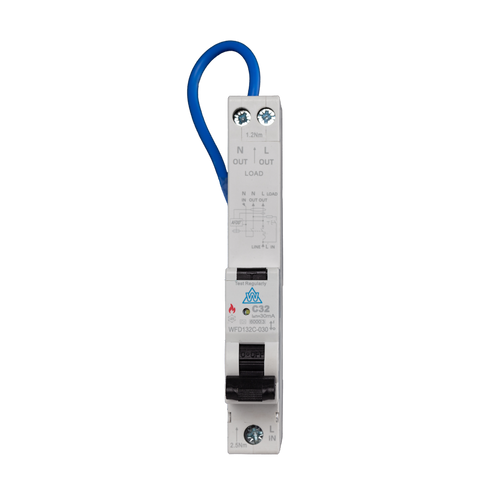Arc Fault Detection Devices (AFDD RCBOs)
Arc Fault Detection Devices (AFDDs) detect and disconnect dangerous arc faults – electrical issues that standard MCBs and RCDs can’t catch. Arc faults are a leading cause of electrical fires, often caused by damaged cables, loose connections, or worn terminals. All AFDDs supplied by Power & Data are BS EN 62606 compliant and UK stocked for next-day delivery.
Read more
Our AFDD RCBOs combine arc fault detection with overload protection and earth leakage protection in one compact device. Fully compliant with the 18th Edition Amendment 2, they are increasingly specified for higher-risk installations such as HMOs, rental properties, and sleeping accommodation.
- AFDD + RCBO in one – detects arcs, overloads, and earth faults
- 18th Edition ready – recommended under Amendment 2 for specific circuits
- Compact 1-module design – DIN rail fit into standard boards
- Trusted for HMOs, rentals & high-risk installs
Need nuisance-trip resistant devices for noisy circuits? Explore our High Immunity RCBO range. For easy returns, check our returns policy.
Arc Fault Detection A-Type RCBO – WFD140B-030 (40A, B Curve, 30mA)
£103.40
The WFD140B-030 is a 40A, B Curve Arc Fault Detection (AFDD) RCBO, designed to deliver maximum protection against arc faults, earth leakage, overload, and short circuits in one compact unit. Built to BS 7671:2018 (18th Edition) standards, it provides fire-safe reliability for high-load domestic and...
Arc Fault Detection A-Type RCBO – WFD132B-030 (32A, B Curve, 30mA)
£103.40
The WFD132B-030 is a 32A, B Curve Arc Fault Detection (AFDD) RCBO, combining arc fault detection, 30mA Type A residual current protection, short-circuit, and overload protection in one compact unit. Fully compliant with BS 7671:2018 (18th Edition), it offers a reliable fire-safe solution for demanding...
Arc Fault Detection A-Type RCBO – WFD120B-030 (20A, B Curve, 30mA)
£103.40
The WFD120B-030 is a 20A, B Curve Arc Fault Detection (AFDD) RCBO, combining arc fault detection, 30mA Type A residual current protection, short-circuit, and overload protection in a single compact unit. Fully compliant with BS 7671:2018 (18th Edition), it provides advanced fire prevention for modern...
Arc Fault Detection A-Type RCBO – WFD116B-030 (16A, B Curve, 30mA)
£103.40
The WFD116B-030 is a 16A, B Curve Arc Fault Detection (AFDD) RCBO, providing arc fault detection, residual current protection (30mA), short-circuit, and overload protection in one device. Designed to BS 7671:2018 (18th Edition) standards, it offers advanced fire prevention and peace of mind for installers...
Arc Fault Detection A-Type RCBO – WFD110B-030 (10A, B Curve, 30mA)
£103.40
The WFD110B-030 is a 10A, B Curve Arc Fault Detection (AFDD) RCBO, combining arc fault detection, residual current protection (30mA), short-circuit, and overload protection in one compact device. Built to BS 7671:2018 (18th Edition) standards, it delivers advanced fire prevention for modern electrical systems. Unlike...
What Is Arc Fault Detection?
An arc fault occurs when damaged or loose wiring causes electricity to jump across gaps. Unlike overloads or earth leakage, arcs generate heat without drawing high current – making them difficult for MCBs or RCDs to detect. AFDDs disconnect supply when these dangerous faults occur, helping to prevent electrical fires.
AFDD Requirements Under the 18th Edition
The 18th Edition Amendment 2 recommends AFDDs for certain installations, including:
- HMOs (Houses in Multiple Occupation)
- Rental properties – especially those with vulnerable occupants
- Sleeping accommodation – bedrooms, hotels, care homes
- High-risk buildings – with flammable or fire-prone materials
While not yet mandatory across all circuits, AFDDs are increasingly required by insurers, landlords, and duty holders to demonstrate compliance and reduce fire risk.
Benefits of AFDD RCBOs
- All-in-one protection – arc fault, overload, and earth leakage
- Compact DIN rail fit – no special board required
- Futureproof – compliant with current and upcoming regulations
- Peace of mind – helps with EICRs, landlord checks, and insurance compliance
Featured AFDDs
- Arc Fault Detection A-Type RCBO (WFD1-B-030) – compact, DIN-rail AFDD + RCBO protection.
- Arc Fault Detection A-Type RCBO 20A (WFD120B-030) – ideal for lower-rated final circuits.
- Arc Fault Detection A-Type RCBO 32A (WFD132B-030) – suited to ring circuits and larger loads.
- Arc Fault Detection A-Type RCBO 40A (WFD140B-030) – for higher-demand or dedicated circuits.
FAQs on AFDDs
Are AFDDs mandatory in the UK?
Under Amendment 2, they are recommended (not mandatory) for circuits supplying sleeping accommodation, rental properties, and high-risk buildings. Many landlords and inspectors now specify them.
What standard do AFDDs comply with?
AFDDs must meet BS EN 62606, the recognised standard for arc fault detection devices.
Are AFDDs expensive?
They cost more than MCBs or RCBOs, but provide a level of fire risk protection not possible with standard devices – particularly valuable in rental and HMO compliance.
Why Buy From Power & Data UK?
We stock UK-tested AFDD RCBOs, backed by manufacturer warranties and next-day delivery options. Orders over £30 qualify for free shipping, with easy returns handled under our returns policy.
Related Categories
- RCBOs – overload + earth leakage protection
- High Immunity RCBOs – false-trip resistant
- Circuit Protection Devices

